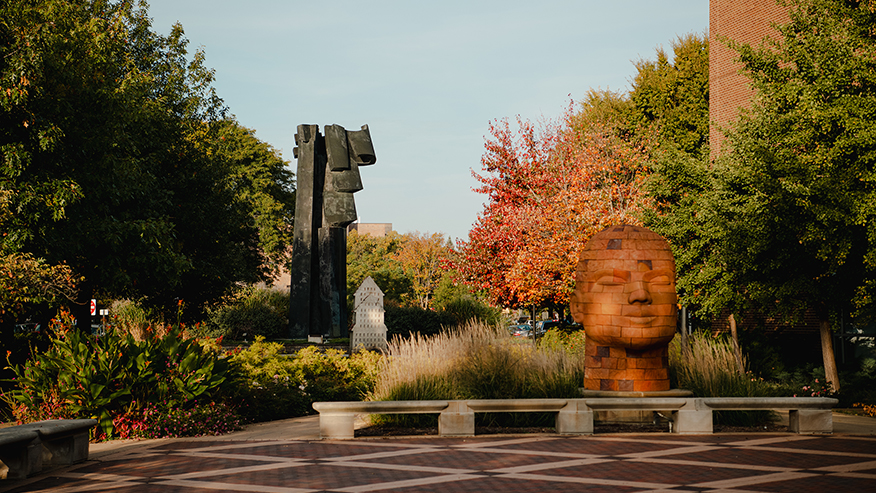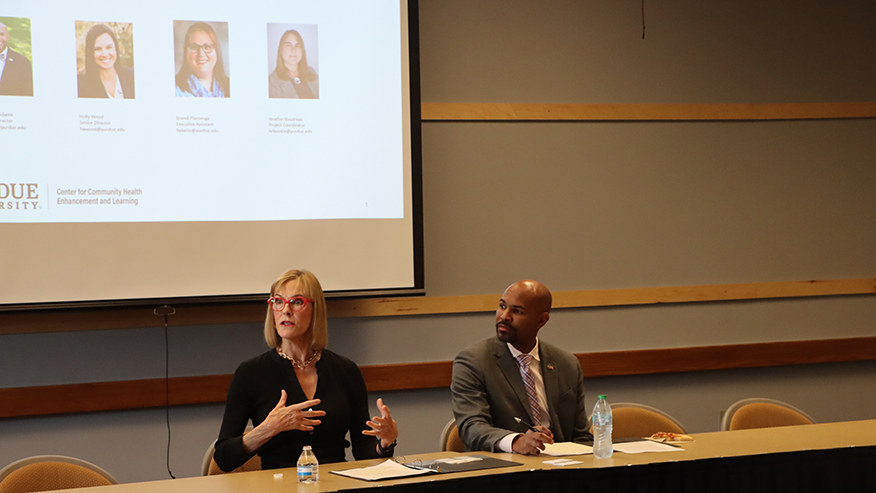Purdue startup Aerovy Mobility develops cloud software to support infrastructure for electric aircraft
Company’s cloud-based software suite includes planning and operational solutions

The advanced air mobility sector includes urban air mobility, which uses electrical vertical takeoff and landing vehicles. Aerovy Mobility, a Purdue University-connected startup, has developed software solutions to benefit airport and vertiport operators and real estate developers looking to establish advanced air mobility technology at existing and potential sites. (Image provided by Electro.Aero)
WEST LAFAYETTE, Ind. —
The advanced air mobility sector, which includes electric-powered urban and regional aircraft, may become a $1.5 trillion market by 2040. A new Purdue University-connected startup could benefit airport and vertiport operators and real estate developers looking to establish advanced air mobility technology at existing and potential sites.
Purdue University postgraduate students have launched Aerovy Mobility, a startup company that commercializes cloud-based software solutions to plan and operate infrastructure that charges electric aircraft with renewable energy.
Nick Gunady is Aerovy Mobility’s CEO, a PhD candidate in Purdue’s School of Aeronautics and Astronautics and research assistant in Purdue’s Center for Integrated Systems in Aerospace. He said improvements in battery energy technologies have improved enough to make electric propulsion technically feasible and economically viable. This includes urban air mobility, which uses electrical vertical takeoff and landing vehicles, and regional air mobility, which may use traditional aircraft configurations that travel greater distances.
“The advances in electric propulsion make travel significantly less expensive: Fuel costs are lower and the aircraft may or may not be piloted. These are two of the biggest costs to airlines,” Gunady said. “There is a huge potential with future mobility to spur economic development in underserved locations because of the reduced cost and difficulty to travel there.”
Gunady said, however, that the U.S. power grid is not ready to handle energy spikes related to charging electric-powered vehicles, especially during rush hour use. A paper presented at the 2022 AIAA Aviation Forum concluded that trillions of dollars may be needed to enhance infrastructure that transmits and distributes electricity.

Aerovy Mobility is addressing those power grid limitations with its software solutions.
“The AATLAS planning software identifies locations that would attract the most demand so operators would be able to make back their investments quickly,” Gunady said. “It also assesses the expected usage over time, simulating charging events minute by minute throughout the day. We can size power generation and storage assets, which enables end users to reduce dependence on the grid.”
Gunady said Aerovy Mobility’s VEMS operational software automatically connects users with all their assets at infrastructure sites, including chargers and off-grid energy systems.
“Customers will have full control over their infrastructure site without physically needing to be there,” Gunady said. “We have built automation tools to remotely connect with the aircraft, charge vehicles, minimize grid cost and dynamically price without any user input.”
The cloud-based software suite was based on work by Purdue graduate and undergraduate students who won the grand prize in a 2022 Federal Aviation Administration contest. Gunady, Akshay Rao, Sai Mudumba, Seejay Patel and Ethan Wright won the Smart Connected Aviation Student Competition with their entry “Advanced Air Mobility as an Electric Grid Demand Response Asset.” Purdue professor and Aerovy Mobility Chief Scientist Daniel DeLaurentis and associate professor Shaoshuai Mou advised the team, along with personnel from GE Aerospace, American Airlines and San Diego International Airport.
Aerovy Mobility recently established a partnership with Altaport, an automation software company based in Salt Lake City; Electro.Aero, an electric aviation charging technology company based in Perth, Australia; Greenstar Aviation Partners, an investment firm based in New York City; and Skyportz, a developer of vertiport infrastructure based in South Yarra, Australia.
It also has been in discussions with other original equipment manufacturers, or OEMs; airports around the world; and major U.S. airlines. The company has several memorandums of understanding, or MOUs, in place. It is looking to raise funds by the end of 2023.
“We are looking to connect with companies and individuals with an interest in exploring electric infrastructure at existing airports or vertiport companies interested in identifying locations to place infrastructure, too,” Gunady said.
Writer/Media contact: Steve Martin, sgmartin@prf.org
Source: Nick Gunady, nick@aerovymobility.com



